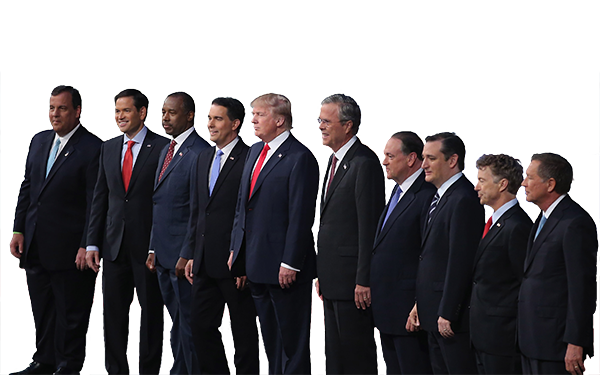The74Million.org will be livestreaming the 2015 New Hampshire Education Summit beginning at 8:50 a.m. EST on Wednesday, Aug. 19. Set to speak at the Summit, which is hosted by The Seventy Four and sponsored by the American Federation for Children, are Jeb Bush, Chris Christie, Carly Fiorina, Bobby Jindal, John Kasich and Scott Walker. More information at EdSummits2015.org
Not so long ago but at a moment whose goodwill seems far away, President George Bush signed No Child Left Behind, the bill that still guides U.S. spending on public education.
NCLB updated existing law (the Elementary and Secondary Education Act) to give unprecedented authority to the federal government in reversing decades of school failure, yet was supported by bipartisan majorities in Congress—startling majorities from today’s perspective: 91-8 in the Senate and 384-45 in the House.
The bill’s signing in January 2002 (and the long negotiations leading up to it) seems far away not just because the nation’s lawmakers decided to problem-solve rather than filibuster, and not just because the aim of their cooperation was expanding federal power.
Also different was the belief that fixing education is essential to our social and economic health, and that leading the country requires summoning the political will to tackle this vast problem.
Another election season has begun and our task now needs to be re-establishing the primacy of education in the campaign conversation. Not because NCLB has been a silver bullet (they don’t exist) but because this country needs its leaders and best minds to reach new solutions or we risk losing another generation of poor and high-need children.
That’s where The Seventy Four comes in. This Wednesday, August 19, we will partner with the American Federation of Children in hosting the first of two 2015 National Education Summits, bringing Republican presidential candidates to Manchester, New Hampshire, to discuss the challenges facing public education.
Confirmed speakers include Jeb Bush, Chris Christie, Carly Fiorina, Bobby Jindal, John Kasich, and Scott Walker. Watch the livestream below, and be sure to check out our speaker profiles as well as our breakdown of where all 22 presidential candidates stand on education issues.


In October, partnering with the Des Moines Register, we will have a similar dialogue in Iowa with the Democratic candidates.
The timing could not be more important or fraught, with issues like the Common Core standards, how to improve and reward teaching, and potential revisions of ESEA to reduce federal influence dividing lawmakers and advocates and reflecting frustration on the ground about what schools should look like.
Nor has there not been a reconsideration of the White House’s role in education in at least 15 years. President Obama’s pro-NCLB reform views built on his predecessor’s and were not appreciably different from the moderate Republicans he ran against.
The latest ESEA re-authorization effort is closer to being passed than any previous attempt, however, and that effort will likely include a shift back to state-based accountability. Heading the 2016 primary season and beyond, the core competency of any presidential hopeful must include the ability to articulate a vision of the chief executive’s role in educational change—and possibly with diminished powers.
Presidential hopefuls who favor reduced executive authority will need to explain how to ensure that states maintain the high standards and accountability essential to college and workforce preparation; in the past, only a few states have been able to do so.
How will the next president avoid a state achievement gap that leads to worse outcomes for millions of students simply because of where they live?
In addition to pushing candidates to give priority to education, The 74’s summits and campaign coverage has two other goals.
The first is to help voters better understand the issues they need to engage. Our national poll of attitudes toward public education confirmed, as other surveys have found, that American have strong but often muddled and inaccurate views.
Most agree that public education is in trouble, with 63 percent saying it is a “serious problem” and nearly a quarter (23 percent) saying it is in “a crisis.”
Nearly three-quarters (74 percent) view the federal government’s role in education negatively but 69 percent say they favor a national standard ensuring that students in different states learn the same skills.
Only 41 percent say they know what the Common Core is, however, with 25 percent saying they have never heard of it. (Here’s everything you need to know) And there is considerable misunderstanding about what the standards are, with 36 percent identifying the Common Core as a standardized test and nearly 22 percent identifying it as a curriculum on a range of topics that includes evolution and sex education.
Only 35 percent would feel more favorably about a candidate who supported the Common Core, while 33 percent would feel less favorably
And while nearly everyone (88 percent) view teachers positively, perceptions of teachers unions are much less favorable: By a 12-point margin Americans are more likely to say teachers unions have hurt rather than helped the quality of public education in the U.S. Among parents, the margin stretches to 22 percentage points (47 percent hurt, 25 percent help).
The 74’s other goal is to show the panoramic range of education’s effects across domestic sectors rather than let it be pushed off the table by issues like economic growth, jobs, and health care.
Because education is a healthcare issue. The government sets targets for increased four-year high school graduation rates as part of its agenda for improving Americans’ health.
That’s supported by lots of research showing that health and longevity improve as educational attainment rises.
A new study finds in fact that finishing high school has the same health benefit as quitting smoking. Researchers determined that the deaths of 145,000 people in 2010 were associated with the fact that they failed to graduate; the deaths of another 110,000 were associated with their failure to earn a four-year degree.
Education is also an economic issue affecting every American. Researchers at McKinsey reported in 2009 that closing racial and income achievement gaps would increase GDP by hundreds of billions annually.
Similarly, a 2014 analysis by the Center for American Progress estimated that closing the racial achievement gap would increase the GDP by more than $20 trillion between 2014-2050, enlarging the economy by nearly six percent, and lifting Social Security tax contributions by nearly $900 billion.
The models are necessarily inexact, but, quoting CAP, they give a sense of scale both to “the massive waste of human talent and opportunity” reflected in achievement gaps and to “the magnitude of the public investments the nation should be willing to make now and in the decades to come.”
It is often said that education is the “civil rights issue of our time.” As campaign season moves forward, it may be more accurate to think of it as the most important issue of our time, and keep pushing until candidates treat it that way.
Get stories like these delivered straight to your inbox. Sign up for The 74 Newsletter


;)
